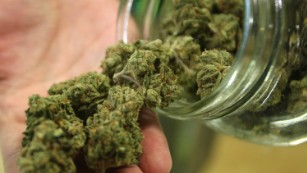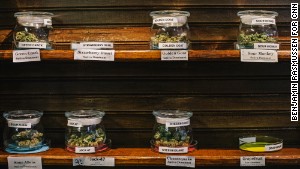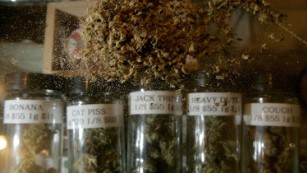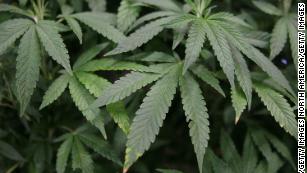Natural Green Herb Update: Daily or high-potency cannabis increases risk of psychotic disorder, study finds
By Susan Scutti, CNN
Updated 7:31 PM ET, Tue March 19, 2019
Play VideoDoes marijuana lead to increase in mental illness? 03:42
(CNN)Legalization of marijuana, both for medical and recreational use, continues to spread across the globe even as the possible health risks (or benefits) are not fully known. Case in point, according to new research, people who use cannabis daily, as well as those who use high-potency weed, may be three times more likely to develop psychotic disorder than never-users.

At least a dozen elementary students exposed to marijuana gummies, police say; mom arrestedPublished Tuesday in the journal the Lancet Psychiatry, the new evidence is consistent with previous experiments that suggest heavy use and high THC concentration cannabis — a 10% concentration of THC (the psychoactive substance within cannabis) or higher — can be harmful to mental health.”Psychotic disorder,” precisely, is what was studied, said Dr. Marta Di Forti, lead author and a clinician scientist at the Institute of Psychiatry, Psychology & Neuroscience, King’s College London. “We are talking about people who meet diagnostic criteria [and] come to the attention of mental health services to receive treatment for psychosis. So they have to have symptoms of psychosis across the spectrum — so hallucination, delusion — that have lasted at least for a week.”
Daily use of cannabis
Currently, medical cannabis is legal in most European countries, though recreational use is only legal in the Netherlands, Spain (under certain conditions), and Czech Republic. Many countries, though, are discussing legalization. In the United States, 10 states and the District of Columbia allow recreational sales of marijuana, while 34 states allow medical marijuana use.

Health concerns drive voters to back Medicaid, weed and trans rightsTo understand whether there’s a connection between cannabis and psychosis, Di Forti and her co-authors looked at data from five countries in Europe — the UK, the Netherlands, France, Spain and Italy — and Brazil, where cannabis is illegal. They found 901 patients with a first-time episode of psychosis over a five-year period and compared them to 1,237 matched non-patients.Daily use of cannabis was more common among patients with psychosis compared to the controls, they found. About 30% of patients reported using cannabis daily compared to just 7% of non-patient controls. And use of high potency cannabis was also more common among patients than controls: 37% compared to 19%.

Colorado marijuana’s potency getting ‘higher’Overall, people who used marijuana on a daily basis were three times more likely to have a first episode psychosis compared with people who never used weed, the researchers estimated. And this increased to five times more likely for those who daily used high-potency cannabis.”High-potency cannabis contributes to incidence of psychotic disorder but doesn’t explain it completely,” explained Di Forti, noting that only some users develop a psychotic disorder and the reasons why not all cannabis users are equally susceptible is unclear. Still, the new study may be helpful with regard to medicinal cannabis, since some of those products may include small amounts of THC. For example, maybe psychosis should be listed among the potential side effects, she said.The study results do not provide enough information for her to say “use only this amount, only this often” to remain safe. Still, she and her co-authors estimated that one in five new cases of psychosis may be linked to daily cannabis use, and one in 10 cases linked to use of high potency cannabis.

10 ways medical marijuana can be used to treat diseaseDr. Robin Murray, senior author of the study and a professor of psychiatric research at the Institute of Psychiatry, Psychology & Neuroscience at King’s College London, said that “15 years ago nobody thought cannabis increased the risk for psychosis.”Only gradually has evidence come out and shown that to be true, he said. Gradually, too, other explanations have been chipped away, he said: For example, some people might say that perhaps a genetic predisposition to schizophrenia led some people to use cannabis and this is the reason for higher rates of psychosis. But a study from Finland rules this out, said Murray: “There may be some genetic component but it’s not the major reason.”In light of the new results, is legalized cannabis a good idea? “Personally, I think it’s much more important that people are educated,” said Murray. “Tobacco is legal, but we’ve seen the consumption plummet because there’s been a sustained educational campaign.”
‘The results need to be taken seriously’
Dr. Michael Bloomfield, head of the Translational Psychiatry Research Group and a psychiatrist at University College London, told Science Media Centre that the new study is both “important and well conducted research” that “adds weight to the advice that people who use cannabis recreationally should avoid high-THC cannabis.”

States that legalized recreational weed see increase in car accidents, studies sayBloomfield was not involved in the new study. Nor was Dr. Adrian James, registrar at the Royal College of Psychiatrists, who told Science Media Centre that the research is “good quality” and “the results need to be taken seriously.””Cannabis carries severe health risks and users have a higher chance of developing psychosis,” said James. “The risks are increased when the drug is high in potency, used by children and young people and when taken frequently.”Dr. Philip McGuire, a professor of Psychiatry & Cognitive Neuroscience at King’s College London, told CNN that the study’s finding that cannabis use is higher among patients with psychosis is “not itself new.” Still the study “involves relatively large numbers of subjects and has controlled for other risk factors that might have accounted for the results” and in that way adds to what is known about marijuana, said McGuire, who played no part in the new research.

Teens aren’t just smoking cannabis, study says — they’re eating and vaping it, tooCannabis contains two ingredients that have opposite effects on psychosis: THC induces psychotic symptoms and cannabidiol, known as CBD, reduces them, he explained.His own research has shown that “if healthy volunteers are given THC this induces transient psychotic symptoms like paranoia. However, if volunteers are given CBD beforehand, this blocks the induction of psychotic symptoms by THC,” said McGuire.McGuire and his co-researchers found that adding CBD to regular antipsychotic medication reduced psychotic symptoms in patients with schizophrenia. “When we used brain scanning to measure the effects of CBD and THC on brain function, we found that they have opposite effects on brain activity, which may explain why they have opposite effects on psychotic symptoms,” he said.Get CNN Health’s weekly newsletter
Sign up here to get The Results Are In with Dr. Sanjay Gupta every Tuesday from the CNN Health team.”The net effect of cannabis that contains both THC and CBD depends on the relative amounts of each,” he explained. “The cannabis that was available in the 1960s was relatively low in THC and high in CBD. However, these days illicit cannabis is often ‘high potency,’ with a high THC content and a low CBD content.””We are currently conducting research to define the ratio of CBD:THC in cannabis that is optimal for minimizing its psychotic effects,” he said.
https://www.cnn.com/2019/03/19/health/cannabis-use-psychosis-study/index.html
